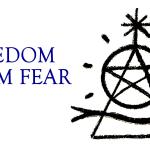Since the 2010 elections, and some would argue since the election of Barack Obama in 2008, Christian social conservatism in the United States has been flexing its muscles. Anti-abortion legislation is at record highs, contraception is a hot-button issue once more, same-sex marriage (not to mention gay soldiers) continues to be used as a political football, and disturbing moments of Christian nativism have been creeping back into our national discourse. There are two popular theories as to why religiously-motivated culture wars have intensified at this moment. The hubris theory, which posits that Christian conservatives have already “won” in changing the American landscape and now are slowly pushing for even more, and the desperation theory, which envisions a demographically doomed conservative Christian rump fighting a rear-guard action against the inevitability of their inconsequentiality.
“…contrary to the whims of lazy pundits, the waning of enthusiasm for battling over “social issues” is not due to higher concerns about jobs, the deficit, and the economic future […] Put simply, the Christian Right is getting old.According to the largest and most recent study we have of American religion and politics, by Robert D. Putnam and David E. Campbell, almost twice as many people 18 to 29 confess to no faith at all as adhere to evangelical Protestantism. Young people who have attended college, a growing percentage of the population, are more secular still. Catholicism has held its own only because the Church keeps gathering in newcomers from Latin America, Africa, and Asia, few of whom are likely to show up at a Santorum rally. To their surprise, Putnam and Campbell discovered that conservative preachers infrequently discuss polarizing issues from the pulpit. Sermons about hunger and poverty far outnumber those about homosexuality or abortion. On any given Sunday, just one group of Christians routinely grapples with divisive political issues: black Protestants, the most reliably Democratic constituency of them all.”
That January 2012 New Republic article by Michael Kazin, quoted above, draws on the work of Harvard professor Robert D. Putnam and Notre Dame professor David E. Campbell, authors of the book “American Grace: How Religion Divides and Unites Us.” In it the two political scientists argue that our religious culture has become increasingly polarized, while at the same time fostering a broad interfaith tolerance. Putnam and Campbell were recently given pride of place in the most recent issue of Foreign Affairs to talk about the intersection of religion and politics (hint: they don’t like it), with much of the piece given over to talking about “nones,” individuals who claim no formal religion.
“In surveys conducted by the authors all “nones” grew by about 18% between 2006 and 2011, but young “nones” grew by about 90%–a truly remarkable difference. Campbell and Putnam have a convincing political explanation of this development: The growth of the “nones”, and especially of their young constituent, is a reaction against the Religious Right.”
What many have pointed out, including those who’ve gathered data on this growing demographic, is that “nones” aren’t anti-religious per se, they are simply against what they feel institutionalized religion has become (ie polarized and fixated on culture war issues). In short, as some would have it, we are becoming a nation of heretics. The big question is, if traditional (ie Christian) religion as we know is declining, if we are entering a post-Christian era, what will take its place? According to religion scholar Diana Butler Bass, author of the recently released “Christianity After Religion: The End of Church and the Birth of a New Spiritual Awakening,” we are at a pivotal moment in history in regards to that question.
“The United States is currently in the throes of a spiritual awakening, says Diana Butler Bass. In her new book, Christianity After Religion, the author argues that we are at a crossroads in history—we can choose to move forward into new emerging spiritualities, or we can heed the siren sound of the traditionalists calling us back to a romanticized, rigid, past.”
Bass makes it plain that this awakening isn’t isolated to Christianity, or even to monotheism.
“…when I talk about the fact that we’re in an awakening, I believe we are in a period of intense cultural reorientation or revitalization, and that during an awakening, politics, worldviews, religion, education—the whole way a society approaches being community, and connecting with one another, and understanding their God or their gods—it all changes.”
I’ve mentioned before that the rise of the “nones” could be a very good thing for modern Paganism, and for religious minorities in general. Many “nones” are picking up spiritual practices from nature and the New Age, and scholars like Bron Taylor, author of “Dark Green Religion: Nature Spirituality and the Planetary Future,” believe that nature-based spiritualities are best equipped to survive the collapse of the traditional religions.
“Where this cognitive shift has been made, traditional religions with their beliefs in non-material divine beings are in decline. The desire for a spiritually meaningful understanding of the cosmos, however, did not wither away, and new forms of spirituality have been filling the cultural niches previously occupied by conventional religions. I argue that the forms I document in Dark Green Religion are much more likely to survive than longstanding religions, which involved beliefs in invisible, non-material beings.”
This all sounds like great news, but it should be noted that Taylor, and Bass, envision a push-back from traditional religions. The numbers may be shifting, generational plate tectonics slowly changing the old religious order, but the near future will continue to be numerically dominated by Christian adherents. For many of these Christians the answer is simple: teach young people the “real,” “authentic,” Christianity that has been distorted by the modern world (an argument that works on both the Christian right and left).
“It all comes down to teaching and role-modeling the elusive real fundamental Christianity to young people. [Drew] Dyck’s book [“Generation Ex-Christian”] , and books like “UnChristian”, “Generation Hex”, “Wicca’s Charm”, and many, many, more, all call for a return to an elusive central core of faith that is pure enough to withstand the rigors of engaging the wider secular/non-Christian world.Christians love these books, because it not only addresses a problem that worries them, but tells them that the solution is to become more Christian as a way to solve the problem.”
The latest call for revival comes from New York Times columnist Ross Douthat, whose “Bad Religion: How We Became a Nation of Heretics” comes out this April. In it, he makes a “urgent call for a revival of traditional Christianity” to “confront our most pressing challenges and accelerated American decline.” Douthat, a proud hurler of the Cynthia Eller brickbat, does not want to live in a “Dan Brown America” and is very, very concerned about Hollywood’s rampant pantheism.
“It’s at once the blockbuster to end all blockbusters, and the Gospel According to James. But not the Christian Gospel. Instead, “Avatar” is Cameron’s long apologia for pantheism — a faith that equates God with Nature, and calls humanity into religious communion with the natural world. In Cameron’s sci-fi universe, this communion is embodied by the blue-skinned, enviably slender Na’Vi, an alien race whose idyllic existence on the planet Pandora is threatened by rapacious human invaders. The Na’Vi are saved by the movie’s hero, a turncoat Marine, but they’re also saved by their faith in Eywa, the “All Mother,” described variously as a network of energy and the sum total of every living thing. If this narrative arc sounds familiar, that’s because pantheism has been Hollywood’s religion of choice for a generation now.”
In the mind of Douthat, and many others, it all comes down to (traditional) Christianity vs. Nature Religion (ie pantheism, New Age beliefs, “false” Christianities, and Paganism). The “green dragon” of environmentalism run amok. A preoccupation spawned by the existential dread of losing one’s invisible privilege in our society. Hence, the uptick in culture-war issues discussed at the beginning of this piece. Of course, being a Pagan, I’m hoping for a day when we truly do enter a post-Christian society. When non-Christian voices, and non-religious voices, truly get seat at the table (as opposed to occasional sympathetic Hollywood films or appearances on reality television). That the moment of reckoning for religion in America swings away from a reestablishment of traditional Christian power, and towards the inclusive awakening envisioned by Bass. A pluralistic nation that lives up to its pluralistic (and pagan) foundations.
In the meantime, keep an eye on the “nones.”
[REMINDER: I am currently raising funds so I can go on assignment to the American Academy of Religion’s Annual Meeting in Chicago this November. Two days into the campaign and I’m already over half-way to my goal! To everyone who has donated so far, THANK YOU, you are making robust and responsive Pagan journalism possible. If you haven’t pledged yet, please consider doing so today, the quicker we reach the goal, the faster we can move forward on building new funding models for Pagan media.]















